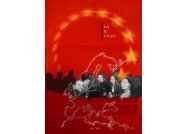turkish-greek civic dialogue - AEGEE Europe
turkish-greek civic dialogue - AEGEE Europe
turkish-greek civic dialogue - AEGEE Europe
Create successful ePaper yourself
Turn your PDF publications into a flip-book with our unique Google optimized e-Paper software.
150<br />
While it was clear that Greek was the language of Greeks and the Greek state,<br />
the Turkish-speaking and the rest of the not Greek-speaking refugees were<br />
found in very difficult place. They were often judged as national suspects,<br />
reaching the point to feel shame for an important piece of their culture, and<br />
therefore, for an important piece of themselves. Thus, through the education<br />
and under the effect of other factors, they resigned from a lot of culture<br />
elements of their Community.<br />
For the Muslim women of Thrace the situation developed rather differently.<br />
They did not need to be moved. However, the borders were moved and they<br />
turned up to be citizens of a national state with different mainstream language<br />
and religion and they became minority, with concrete rights that were based in<br />
the Treaty of Lausanne. Their Community structures were recognized and they<br />
continued existing.<br />
Therefore the children of minority Muslims of Thrace continued studying in the<br />
Community schools that were managed from the Muslim clergy.<br />
However, since beginning, contradictions created between innovators that<br />
were supporters of the Turkish national ideas and conservatives, who were<br />
supporters of national perceptions, regarding the control of education of<br />
minority. In the beginning of 1950 decade, because of the improvement of<br />
Greek-Turkish relations - mainly because of the attendance of both countries<br />
in the NATO - the innovators prevailed and the minority educational system<br />
acquired a Turkish character. The Turkish school, existing under the control<br />
of individuals that were supporters of Turkish nationalistic ideas, taught the<br />
Turkish language not only in children that had the Turkish language as maternal,<br />
but also in children that in their families spoke “Pomak” – a southern Bulgarian<br />
dialect - but also gipsy, cultivating systematically the feeling of belonging in<br />
Turkish nation.<br />
After the period 1955 - 1975, it was sought to exclude any kind of interference<br />
of Turkey in the minority education and to erase the elements related with<br />
the culture of the Turkish national idea. The improvisation of the application<br />
of this system resulted in a remarkable decrease of quality of the minority<br />
education system.<br />
Studying the education of minority Muslims of Thrace during the period 1923-<br />
1995, we observe that the minority education system, under the guidance of<br />
persons supporting the Turkish national ideology, was improved considerably<br />
and it reached the point to offer to the students a modern education. It<br />
contributed considerably in the homogenisation of Thracian Muslims and in the<br />
culture of perception that they belong in the Turkish nation, facilitating thus,<br />
those who decided to immigrate in Turkey, to subsume smoothly in the Turkish<br />
society and economy.<br />
There are three basic ascertainment that I want to stress:<br />
1. The Greek public education played a decisive role in the integration<br />
in the Hellenic reality of the refugees, and in their homogenisation<br />
with the local Greeks, in the boundaries of the Greek nation.<br />
2. The minority education contributed decisively in the culture of<br />
Turkish national identity in the Thracian Muslim minority.<br />
This system created important conditions for their integration<br />
in the Turkish society, depriving them, however, substantially the<br />
possibility of integration in the society and the economy of the<br />
state in which they were citizens, condemning them thus in<br />
marginalisation, “ghettoisation” and social exclusion.<br />
3. The religion that constituted also the basic criterion for the<br />
exchange of populations appears to be, if not the vehicle, sure<br />
the key that opened the door of integration placing the conditions<br />
of homogenisation. The religion constituted the main criterion of<br />
belonging in the nation.<br />
80 years have passed since about 2 million persons were compelled to abandon<br />
their hearts, to move, even to thousands of kilometres away, and to rebuild<br />
their lives from the beginning. Opposite interests, different estimates,<br />
disagreements and litigations will always exist. It’s not possible, however,<br />
persons to be killed or to be persecuted because they have other language and<br />
other religion, because they belong in another nation. We, the children and the<br />
grandchildren of persons that for these reasons were turned away 80 years ago,<br />
let’s play a leading part in spreading over of this message.<br />
Population Exchange Association des Etats Généraux des Etudiants de L’<strong>Europe</strong>







